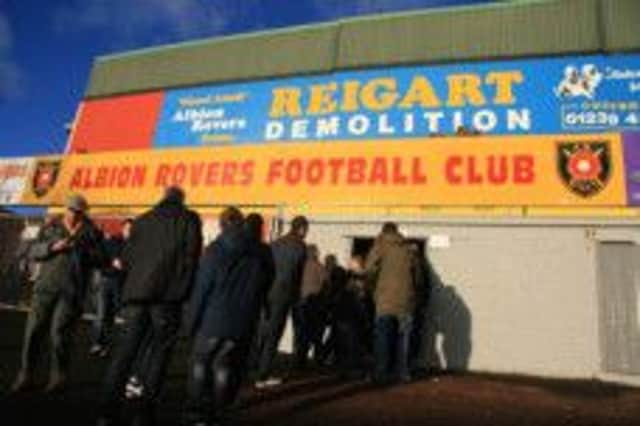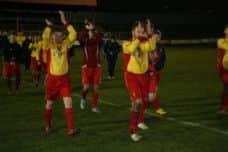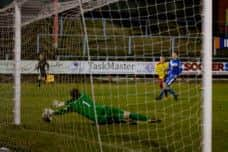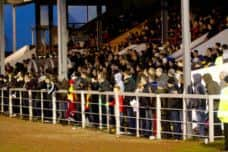Blog: cut-price tickets pay off for Albion Rovers


The thing with football being a source of entertainment is that, when compared to other weekend pastimes, it must be “value for money”. When the economic climate is as bleak as it is just now, this is even more so the case; a correlation between price and “product” (for want of a better consumerist title) must remain at a constant.
On Saturday, Albion Rovers made their Scottish League Two match with Montrose £1 minimum entry for adults (children, as per at Cliftonhill get free entry), in doing so making a family visit to the game as little as £2. The “Pay What You Can” initiative was originally launched in 2012 by Brentford, and was recently used by Berwick Rangers for their match (also in League Two) against Peterhead last month.
Advertisement
Hide AdAdvertisement
Hide AdIn terms of PR, Saturday’s match initiative was undoubtedly a success for the club from Coatbridge; the attendance of 718 was nearly double the average gate at Cliftonhill this season, and easily surpassed the season’s best of 538 when Queen’s Park visited last month.


The event was featured on Sky Sports News, and was also covered on BBC Sport’s website and The Guardian. On social media the campaign snowballed, with endorsements from journalists, clubs and fans alike reflecting how platforms such as Twitter can be used positively by clubs of all size and stature.
The greatest achievement of Saturday’s match, however, was its ability to reconnect Albion Rovers with the Coatbridge community.
Like so many clubs in Scotland (let alone Lanarkshire), Albion Rovers struggle to attract fans due to their proximity to the two leviathans which live just eleven miles away in Glasgow. Days like Saturday are certainly encouraging to see for those who would like to see that trend bucked. Frank Meade, a director at the club, was handing out free scarves to fans in the packed Main Stand, while a contingent of teenagers congregated into a singing section, and created and sustained a great atmosphere with chants, flags and drums. For the younger fans, “Rover the Underdog” performed his duties amicably, although seeing the mascot minus the head whilst buying a pre-match pie shattered the illusion somewhat.
My earliest experiences of Albion Rovers have come, I hate to admit, relatively recently. Whilst an editor of a sports blog, the site did a feature on musician Gav Prentice’s love for the Rovers. In the video for his song “Burning Down”, cameras follow his journey from his house to Cliftonhill for a match against Queen’s Park, from getting off the train at Coatdyke to visiting his Gran for a cup of tea. Ever since watching that video, Cliftonhill has always been on my list of grounds I want to visit.


On Saturday, I got to tick it off my list.
Cliftonhill
Unlike most other grounds, Cliftonhill is (shock) on a hill. Grass banks sit behind either goal while terraces, both a ramshackle of wood and pillars, hug either wing. The areas behind the goals are minimal, but provided enough space to park a car (which, indeed, one or two people had done). On paper, the surroundings do not sound all together that appealing, but visiting the ground is a far more enriching experience than the words on paper convey. Despite the grass banks, the shape of the ground - a tight, compressed oval - means that a fine atmosphere is easily generated and maintained for 90 minutes.
Unfortunately, because of the age of the terracing, for safety reasons Rovers have to play home matches against teams with large travelling supports elsewhere; their Ramsdens Cup tie with Rangers was switched to Livingston, while their local derby with Motherwell in the Scottish Cup was relocated to Hamilton.


Only the Main Stand was in use on Saturday; segregation of any kind between the two sets of supporters would have been an irrelevance, especially with spirits so high with fans of both sides embracing the initiative. Indeed, the enthusiasm for the day was epitomised by the reception both teams received as they left the tunnel.
Advertisement
Hide AdAdvertisement
Hide AdIn the match itself, Rovers used the bumper crowd’s support to surge into an early lead. A handball from Montrose’s Alan Campbell led to a penalty for the home side, which Scott Chaplain duly slotted into the bottom left-hand corner past Stuart McKenzie.
As it turned out, the penalty after 12 minutes proved to be the only goal of the game. Montrose’s Bryan Deasley, usually the visitors’ biggest threat, struggled to get service in what was mostly a tight match, reflecting their close proximity to each other in League Two. Ryan Donnelly was inches away from doubling the home side’s advantage after 30 minutes, as he latched on to a long ball, only to pull his lob over McKenzie just wide. Montrose applied pressure as full-time loomed, with Scott Johnstone squandering a great chance in the 80th minute. The three points, however, belonged to the Rovers.
While three points are always welcomed, I suspect that even if Rovers had failed to win on Saturday, the day regardless would have been a success. It all depends on one’s definition of success, of course. A look at the history books shows that Rovers have spent much of their time in the Scottish lower leagues, without a major trophy to their name and only one Scottish Cup final appearance, against Kilmarnock, in 1920. But what Saturday showed is that football, with the position it has in Scottish society, is not just about trophies, but about a team’s place in the community. From what I witnessed on Saturday, Rovers certainly went a long way to reaffirming its position within Coatbridge, and made some headlines in doing so. As Gregory said, football is all about entertainment; Rovers, in a league in which nine of the teams are separated by only 13 points, can definitely provide that.
SEE ALSO: